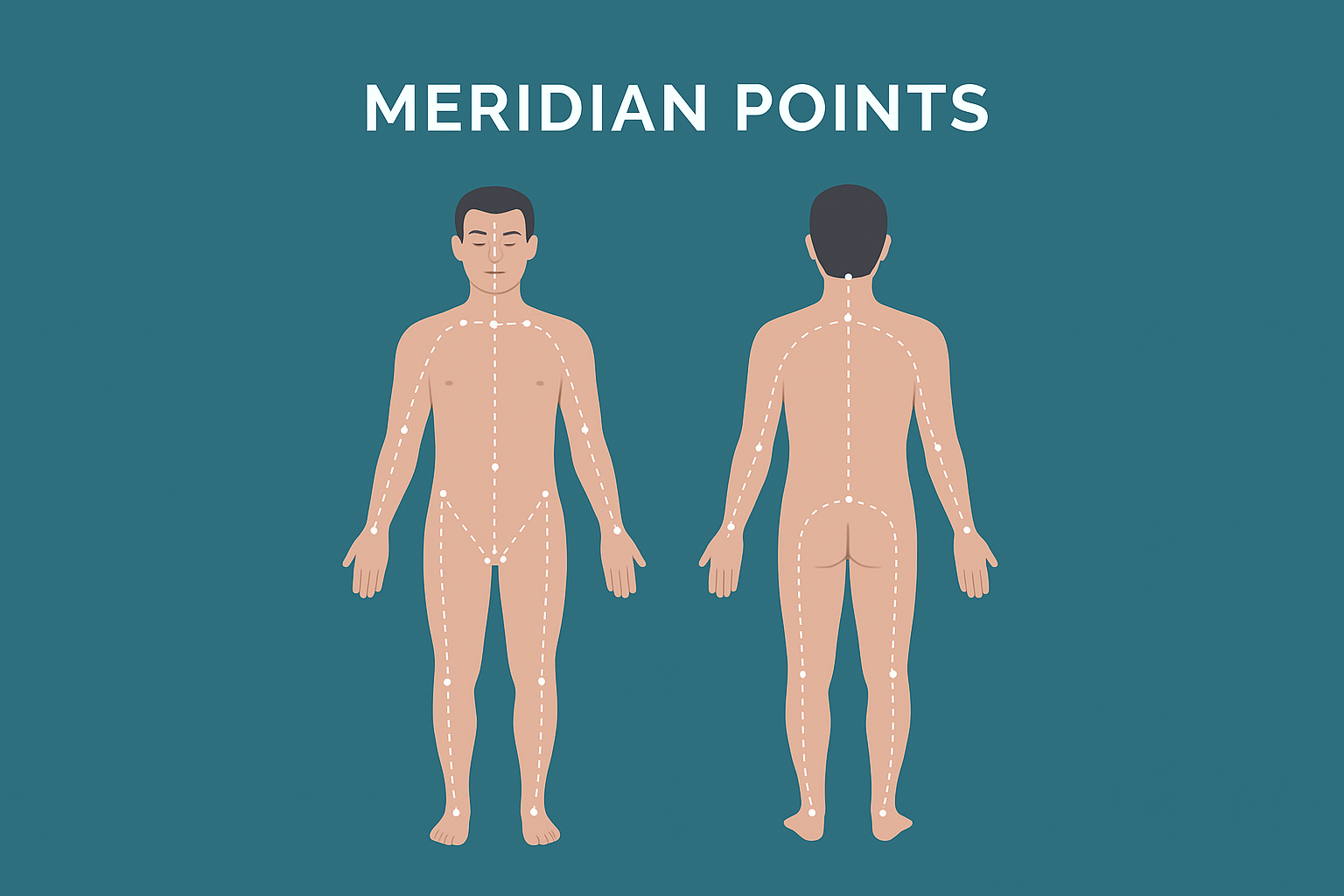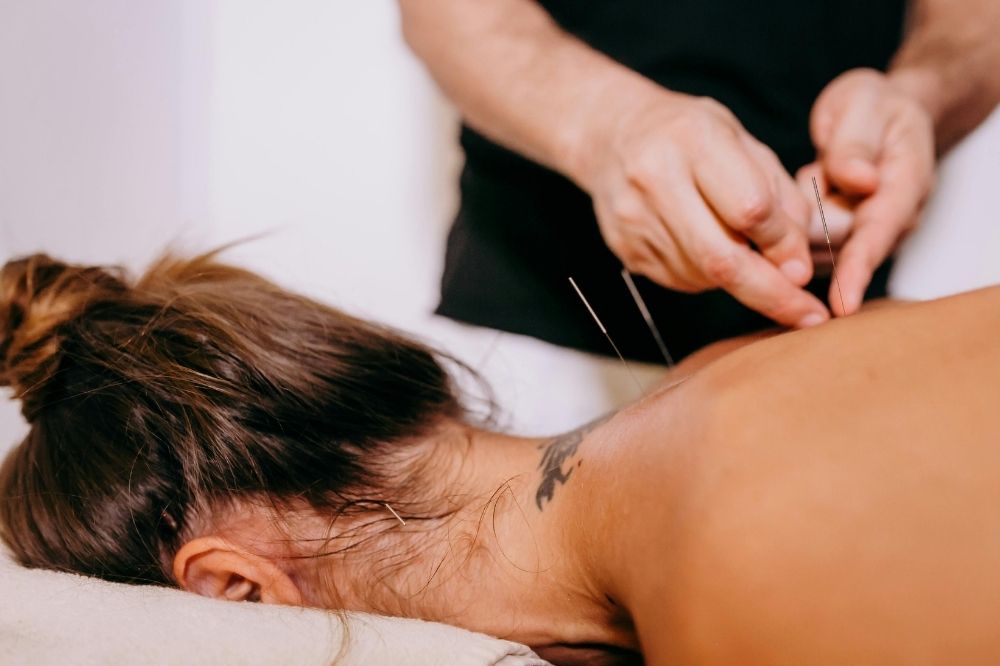Acupressure and acupuncture are closely related therapies – they are both rooted in Traditional Chinese Medicine and they both focus on restoring balance within the body. However, they differ in technique, sensation, and application.
Let’s explore this further. Read on for more on the differences between acupuncture and acupressure, as well as their similarities.
What is Acupuncture?
Acupuncture is a therapeutic technique that involves inserting fine, sterile needles into specific points along the body’s meridians (the pathways through energy or ‘Qi’ flows). This aims to improve circulation, restore balance and support the body’s natural healing process.
Acupuncturists insert needles into precise points in your body, which stimulates nerves, muscles and connective tissue. This then triggers your body to release natural painkillers and reduce blood flow. When used in Traditional Chinese Medicine, acupuncture rebalances energy flow to boost physical and emotional well-being.
Sessions last around 20 minutes, but results can last anywhere from a few days to several weeks.
Best for:
- Chronic pain (e.g – back, neck, or joint pain)
- Fertility support and hormonal balance
- Stress, anxiety, and low mood
- Nerve pain or sciatica
- Sleep and energy regulation
Benefits:
- Promotes relaxation and mental clarity
- Supports natural healing and recovery
- Reduces inflammation and improves circulation
- Improved well-being
Learn more in our guide to the long-term benefits of acupuncture.
What is Acupressure?
Acupressure, on the other hand, uses physical pressure instead of needles to the same meridian points targeted in acupuncture. Acupressure practitioners use their hands, fingers, or sometimes even special tools to apply rhythmic pressure to key points on the body.
The pressure can release muscle tension and promote circulation across the body, and many believe it helps energy flow freely throughout the body. Acupressure is often described as a blend of massage and acupuncture (without the needes). You can get acupuncture therapy from a trained therapist, or even do it yourself when you learn the basic pressure points. We have a helpful guide on hand pressure points if you want to get started!
Best for:
- Mild pain or tension
- Stress relief and relaxation
- Headaches and fatigue
- Digestive discomfort
- Supporting overall energy and mood
Benefits:
- Non-invasive and safe for all ages
- You can do it yourself with practice
- Relieves stress and promotes calm
- Gently boosts circulation and flexibility
Key Differences Between Acupressure and Acupuncture
Both therapies aim to balance energy flow and support natural healing, but they have some distinct differences…
| Aspect | Acupuncture | Acupressure |
| Technique | Involves inserting fine needles into energy points | Uses manual pressure on the same points |
| Invasiveness | Minimally invasive | Non-invasive |
| Feels like | Mild tingling, dull ache, or warmth | Gentle pressure or a massage-like feeling |
| Best For | Chronic or deep-seated pain, fertility, stress, nerve issues | Relaxation, tension, mild pain |
| Practitioner | Licensed acupuncturist | Massage therapist or trained practitioner |
| Tools Used | Sterile needles | Hands, fingers, or tools like acupressure mats |
In short: acupuncture is generally more targeted and clinical, whereas acupressure offers a gentler, more accessible approach.
1 – Technique and Sensation
Acupuncture uses fine needles to stimulate energy points, whereas acupressure involves pressure using hands or fingers (sometimes tools). With acupuncture, you can expect a mild tingling or ache, but with acupressure, you can expect a massage-like sensation.
2 – Level of Invasiveness
Actupuncure is minimally invasive but must still be performed by a trained practitioner. Acupressure, on the other hand, is non-invasive – you can even do it yourself once you know the correct points.
3 – Uses
Acupuncture is often chosen for chronic or complex conditions, while acupressure is ideal for relaxation, tension, and everyday stress relief.
Similarities Between Acupuncture and Acupressure
Although they are two different practices, acupuncture and acupressure share some similarities. Let’s take a look:
1 – Both Target Energy Pathways (Meridians)
Both therapies are based on the concept of energy channels that run throughout the body. The two therapies stimulate these meridian points, which can help remove blockages so energy (or Qi) can flow freely.
Meridian points run from the head to the feet, across the front, back and sides. They are concentrated around areas like the face, neck, chest, arms, hands, legs and feet.

2 – Both Promote Relaxation and Stress Relief
Both techniques can activate the parasympathetic nervous system, which can help reduce stress hormones and make you feel deeply relaxed.
3 – Both Complement Western Medicine
Acupuncture and acupressure are both widely considered complementary therapies that can improve recovery when used alongside conventional treatments. For example, many use these two therapies alongside conventional treatments for chronic pain, fertility, and emotional well-being.
Experience the Benefits of Acupuncture Today
At Concordia Clinic in Liverpool, we offer tailored acupuncture treatments designed to support your physical and emotional well-being. Perfect if you’re seeking pain relief, fertility support, or simply a moment of calm, we provide a professional experience in a relaxing setting.
Book your acupuncture session today and experience the difference for yourself.
Acupuncture vs Acupressure FAQs
Which is better for pain relief?
Acupuncture is often considered more effective for chronic or severe pain, as the needles can reach deeper muscle layers and trigger stronger physiological responses. Acupressure, however, can still help relieve tension and mild discomfort—especially when used regularly.
Can I do acupressure at home?
Yes, you can do acupressure at home. Once you learn the basic acupoints, you can apply gentle pressure to yourself to relieve tension, headaches, or stress. For professional results, though, we recommend going to a trained therapist.
Does acupuncture hurt?
Not usually. You may feel a slight tingling or dull ache when the needles are inserted, but most people find the treatment relaxing. For more details, read our post on what to expect during acupuncture.
Can I combine acupuncture and acupressure?
Absolutely! In fact, in many instances, we recommend it. Many people find that using acupressure between acupuncture sessions helps maintain results and promotes ongoing relaxation.


Recent Comments